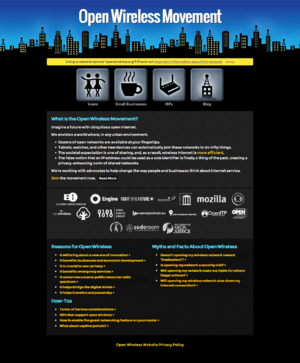Difference between revisions of "Open Wireless Movement"
| (One intermediate revision by one other user not shown) | |||
| Line 1: | Line 1: | ||
[[file:Screenshot-openwireless org 2016-08-18 18-36-20.png| thumbnail |right]] | [[file:Screenshot-openwireless org 2016-08-18 18-36-20.png| thumbnail |right]] | ||
| − | '''Self-portrait''' | + | == <small>'''Self-portrait'''</small> == |
''What is the Open Wireless Movement?'' | ''What is the Open Wireless Movement?'' | ||
| Line 18: | Line 18: | ||
''Join the movement now.'' (https://openwireless.org/) | ''Join the movement now.'' (https://openwireless.org/) | ||
| − | '''Description''' | + | == <small>'''Description'''</small> == |
| − | Open Wireless Movement | + | Open Wireless Movement is a coalition whose purpose is to open networks, develop technology to allow the sharing of wifi, and generate a new internet culture for a more supportive and efficient service. It was founded in 2011 by a coalition lead by the EFF (Electronic Frontier Foundation), a non-profit organization defending civil liberties in the digital world, and co-founded by John Perry Barlow, Brian Behrlendorf and a group of activists such as Bruce Schneier, whose technological ideas on security and technology are fundamental to the approach of the Open Wireless movement. |
| − | + | The EFF is a non-profit organization responsible for defending civil liberties in the digital world —e.g. privacy, freedom of expression— and also carries out analysis on echnological development policies. | |
| − | + | The project is a reaction to demanding needs of the population and particularly to emergency situations related to natural disasters: for example, during Hurricane Sandy, a conclusion was drawn that no reliance could be placed on internet services offered by companies sucha as AT&T or Verizon. | |
| − | Open wireless | + | Open Wireless works with volunteer engineers to build technologies that enable people to open their wireless networks without compromising their safety or sacrifice bandwidth. It is also its goal to re-educate ISPs (Internet Service providers), individuals and business on the use of internet services. Currently, even though some ISPs explicitly prohibit the closing of networks, there are still other that include the possibility of this closure in their terms of service. |
| − | + | For small businesses, the open network has manu benefits, as it can be used to attract customers to get connected or check their social media, as a way of compensating the public space in which they operate. | |
| − | + | ||
| + | == <small>'''Links'''</small> == | ||
'''URL:''' https://openwireless.org | '''URL:''' https://openwireless.org | ||
| Line 36: | Line 37: | ||
'''Wayback Machine:''' https://web.archive.org/web/*/https://openwireless.org | '''Wayback Machine:''' https://web.archive.org/web/*/https://openwireless.org | ||
| − | |||
[[Category:Projects]] | [[Category:Projects]] | ||
| Line 42: | Line 42: | ||
[[Category:English]] | [[Category:English]] | ||
[[Category:USA]] | [[Category:USA]] | ||
| + | [[Category:2010]] | ||
[[Category:Open spectrum]] | [[Category:Open spectrum]] | ||
| − | [[Category: | + | [[Category:Nonprofit]] |
Latest revision as of 22:41, 10 June 2017
Self-portrait
What is the Open Wireless Movement?
Imagine a future with ubiquitous open Internet.
We envision a world where, in any urban environment:
- Dozens of open networks are available at your fingertips. - Tablets, watches, and other new devices can automatically join these networks to do nifty things. - The societal expectation is one of sharing, and, as a result, wireless Internet is more efficient. - The false notion that an IP address could be used as a sole identifier is finally a thing of the past, creating a privacy-enhancing norm of shared networks.
We're working with advocates to help change the way people and businesses think about Internet service.
Join the movement now. (https://openwireless.org/)
Description
Open Wireless Movement is a coalition whose purpose is to open networks, develop technology to allow the sharing of wifi, and generate a new internet culture for a more supportive and efficient service. It was founded in 2011 by a coalition lead by the EFF (Electronic Frontier Foundation), a non-profit organization defending civil liberties in the digital world, and co-founded by John Perry Barlow, Brian Behrlendorf and a group of activists such as Bruce Schneier, whose technological ideas on security and technology are fundamental to the approach of the Open Wireless movement.
The EFF is a non-profit organization responsible for defending civil liberties in the digital world —e.g. privacy, freedom of expression— and also carries out analysis on echnological development policies.
The project is a reaction to demanding needs of the population and particularly to emergency situations related to natural disasters: for example, during Hurricane Sandy, a conclusion was drawn that no reliance could be placed on internet services offered by companies sucha as AT&T or Verizon.
Open Wireless works with volunteer engineers to build technologies that enable people to open their wireless networks without compromising their safety or sacrifice bandwidth. It is also its goal to re-educate ISPs (Internet Service providers), individuals and business on the use of internet services. Currently, even though some ISPs explicitly prohibit the closing of networks, there are still other that include the possibility of this closure in their terms of service.
For small businesses, the open network has manu benefits, as it can be used to attract customers to get connected or check their social media, as a way of compensating the public space in which they operate.
Links
Wayback Machine: https://web.archive.org/web/*/https://openwireless.org
